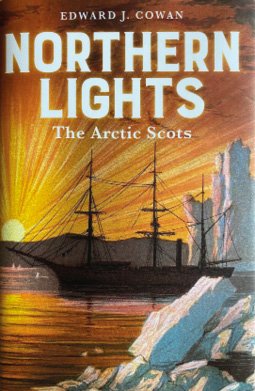Northern Lights: The Arctic Scots
A review by Mike Brown of the book Northern Lights: The Arctic Scots by Ted Cowan.
Ted Cowan
Professor Ted Cowan had a life-long interest in the history of the northern world and the role of Scots in its exploration. Northern Lights: The Arctic Scots was his definitive book on the subject. He had just completed its full draft when he died, unexpectedly, at his home in the Glenkens in 2022. His widow, fellow historian and research collaborator Dr Lizanne Henderson oversaw the book’s final stages from manuscript to publication last autumn. It is an absorbing and far-reaching study of the Scots who contributed so much to Arctic exploration.
Starting a review by quoting a footnote may be unusual but a reference, in the chapter on ‘Scots and the Inuit’, is particularly revealing. Ted recalls being in the library in Mittimatalik (Pond Inlet), an Inuit community on Baffin Island, when “someone came in excitedly to tell me that a group of Inuit girls were demonstrating my culture in the neighbouring hall… they were about to perform dances and tunes their ancestors had learned from the Scottish whalers. There followed a cross-cultural concert that was deeply moving.” It is a vignette which captures the spirit of the book, its many surprises and Ted’s immersive pursuit of history. Those who knew Ted can vividly picture the conviviality - and enquiring - that ensued.
Northern Lights records many familiar names: John Ross from Stranraer, his nephew, James Clark Ross and John Richardson of Dumfries. The role of Orcadian John Rae, independent and unorthodox, has long been celebrated. But less heralded names abound. William Penny, the Peterhead skipper was typical of many whalers who exchanged knowledge with the Inuit and aided the explorers. His wife Margaret was the first European woman to overwinter on Baffin Island. The journals and letters of surgeons, traders, scientists, seamen and explorers reveal acute observation, wonder at the world they traversed and, for the time, an astonishing empathy with the Inuit - or “Arctic Highlanders” as Ross dubbed them.
Scots in the Arctic were eager to learn and, like the whalers, showed more flexibility and imagination than the rigid thinking of the British Navy, thirled to its traditions. Scots played a key role as traders/explorers in the Hudson Bay Company and this brought further access to the skills and knowledge of the Inuit and First Nations.
The book scans the centuries, from Scots in 10th century Viking expeditions through to Sir John Franklin’s search for the Northwest Passage in the mid 19th century. Once Franklin disappeared, an international assortment of adventurers, driven by valour or vanity, Scots prominent among them, swarmed north in his pursuit. A rampant media egged them on and the charismatic Lady Jane FranklIn led the hue and cry.
Speculation among the Europeans knew no bounds but the Inuit knew the facts. John Rae, who listened to them, brought word of the grisly truth, cannibalism and all. But you would expect as much from an “uncouth Scot" said the London establishment: they never forgave him.
Northern Lights: The Arctic Scots, by Edward J Cowan is published by Birlinn, £30, ISBN 9781780277875


